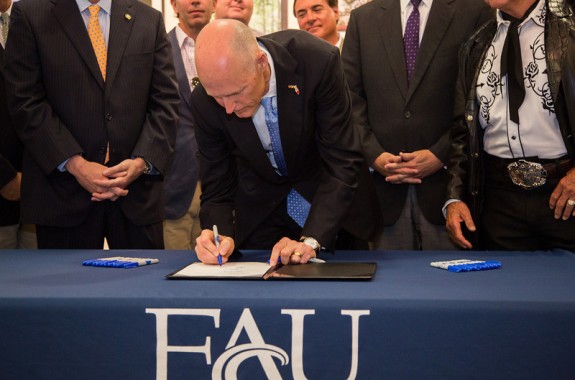
Gov. Rick Scott signed into law looser environmental rules at the same time the state’s environmental regulatory agency laid off attorneys. (Photo courtesy of Rick Scott.)
By Ashley Lopez
Florida Center for Investigative Reporting
Environmental regulations and the agency that implements them in Florida went through some big changes last week, and according to environmentalists, they aren’t good changes.
Gov. Rick Scott signed House Bill 999 into law last week. The bill relaxes a slew of environmental regulations on businesses within the state.
The Florida Current reports that the bill garnered fierce opposition from environmental groups in the state.
According to the Current:
During the session,Rep. Jimmy Patronis, R-Panama City, described his HB 999 as a “Christmas tree.” He also said such legislation he has introduced the past three years brings warring factions on permitting issues together to resolve their differences.
But environmental groups rallied against the measure and eventually got it stripped of language placing a moratorium on local fertilizer regulations and exempting stormwater utilities from local wetlands ordinances.
Former U.S. Sen. Bob Graham, D-Miami Lakes and chairman of the Florida Conservation Coalition, said Thursday HB 999 still contains an objectionable provision ratifying 30-year no-bid farming leases approved by the Cabinet in January.
“It’s a better bill than it was by eliminating those (fertilizer and wetlands) provisions and the other deletions that occurred along the process,” Graham told The Florida Current. “But it’s still in my judgment not advancing the public interest of protecting Florida’s natural resources.”
The Tampa Bay Times reports that Gov. Scott received “more than 350 letters or emails urging him to veto [the bill].” However, last week Scott signed the bill anyway.
Here are some of the provisions in the bill listed by the Times:
• Blocking the Florida Wildlife Federation from suing to overturn a controversial decision by Scott and the Cabinet to grant 30-year leases to 31,000 acres of the state’s Everglades property to two major sugar companies.
• Preventing water management districts from cutting back groundwater pumping by any entity that builds a desalination plant to increase its potential water supply. “I don’t think we should be tying the hands of the water management districts to better promote conservation of water,” Graham said.
• Speeding up the permitting for natural gas pipelines that originate in other states, such as the new 700-mile one from Alabama that’s being planned by Florida Power & Light.
• Forbidding cities from asking an applicant more than three times for additional information before approving development permits.
At the same time Scott changed the rules for environmental permitting, the Florida Department of Environmental Protection (DEP) went through another round of layoffs.
According to The Orlando Sentinel, Christopher Byrd and Kelly Russel “were fired last month by DEP General Counsel Matthew Leopold in identical letters notifying them the office’s goals would be ‘accomplished more effectively by removing you from your positions.'” The Sentinel reported that two other lawyers also resigned, “and one suggested it wasn’t by choice”:
DEP has said the dismissals were part of a streamlining necessitated by the decreased volume of permits flowing through the agency since the Great Recession.
Back in 2006, DEP fielded roughly 38,000 permit applications a year from developers, other businesses or residents, a figure that has leveled off at around 19,000 annually now, according to the agency.
Likewise, the number of “enforcement actions” against polluters has dropped markedly — from a peak of 2,289 in 2010, the last year before Scott took office, to just 799 last year. So far in 2013, there have been only 145 enforcement cases where DEP has found someone violating environmental-permitting rules.
“These staffing decisions were made as … a new manager assessed his team and made decisions on who can best handle the legal issues within the Department,” DEP spokesman Patrick Gillespie wrote in an email. “As our compliance numbers have increased, there have been fewer enforcement cases for attorneys to handle.”
State Sen. Darren Soto, D-Orlando, has announced he will look into the firings, WFSU reports:
Soto said he’s worried [the attorney’s] firings bode poorly for the agency’s ability to protect the environment.
“One of the statements made early on about the firings is that they don’t need the positions because they’re in less litigation. And my belief is that they’re in less litigation because they’re not pushing cases that they should potentially,” he said.
Soto wrote a letter on Wednesday to DEP Secretary Herschel Vinyard, asking for public records including personnel files and correspondence about the fired attorneys.
The Times reports that Soto alleged “the departures were suspicious given the department’s ‘cozy’ relationship with development interests under Scott.”
In December 2013, the DEP laid off 58 employees. One of the employees said the mass layoffs at the end of 2012 “were designed to loosen regulation of polluting industries,” the Times reported on Dec. 24, 2012.
